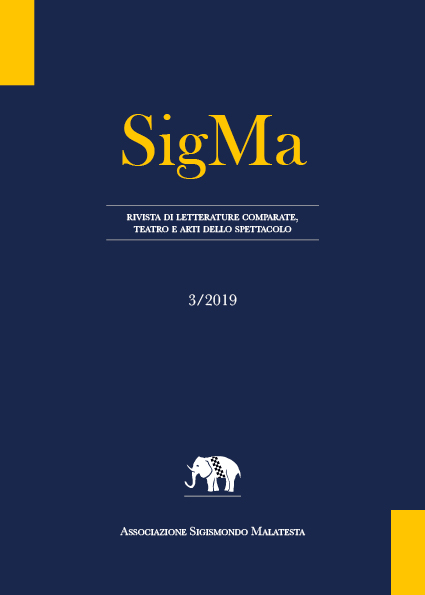Dietro le quinte del quotidiano. Lo sguardo dei domestici da Proust a Cuarón
Abstract
Posti fisicamente ai margini della vita di famiglia, i domestici sono testimoni attenti delle sue dinamiche, scenografi minuziosi dei suoi ambienti, fieri custodi dei suoi segreti, solenni ministri dei suoi riti. Essi offrono, pertanto, uno sguardo privilegiato, dall'interno e dal basso, attraverso il quale osservare e narrare i ritmi e gli spazi della vita di tutti i giorni. Fermarsi a riflettere sul loro ruolo nell’ambito di un’indagine più ampia sulle rappresentazioni del quotidiano significa provare a calarsi entro gli interni domestici ed assumere il punto di vista, del tutto peculiare, di chi li abita, o meglio ancora di chi li predispone alla vita degli altri. A partire da queste premesse, l’articolo si propone di analizzare la figura dei domestici, in chiave intermediale, ripercorrendo alcune sue significative incarnazioni novecentesche e contemporanee: dalla Françoise di Proust alla Cleo di Cuarón, passando per la fedele Crosby di Virginia Woolf, le figure perturbanti di Anna Édes (Kosztolányi), Emerenc (Szabó) e Marta (Kupermann), fino allo sfaccettato e stratificato staff di Downton Abbey.
Downloads
SigMa pubblica in internet, ad accesso aperto, con licenza:
|
|
CCPL Creative Commons Attribuzione |
L'autore conserva il copyright sul suo contributo, consentendo tuttavia a chiunque "di riprodurre, distribuire, comunicare al pubblico, esporre in pubblico, rappresentare, eseguire e recitare l'opera", purché siano correttamente citati l'autore e il titolo della rivista. L’autore, al momento della proposta di pubblicazione, è inoltre tenuto a dichiarare che il contenuto e l’organizzazione dell’opera è originale e non compromette in alcun modo i diritti di terzi, né gli obblighi connessi alla salvaguardia di diritti morali ed economici di altri autori o di altri aventi diritto, sia per testi, immagini, foto, tabelle, sia per altre parti di cui il contributo può essere composto. L’autore dichiara altresì di essere a conoscenza delle sanzioni previste dal codice penale e dalle leggi speciali per l’ipotesi di falsità in atti ed uso di atti falsi, e che pertanto Reti Medievali è esente da qualsiasi responsabilità di qualsivoglia natura, civile, amministrativa o penale, e sarà dall'autore tenuta indenne da qualsiasi richiesta o rivendicazione da parte di terzi.

